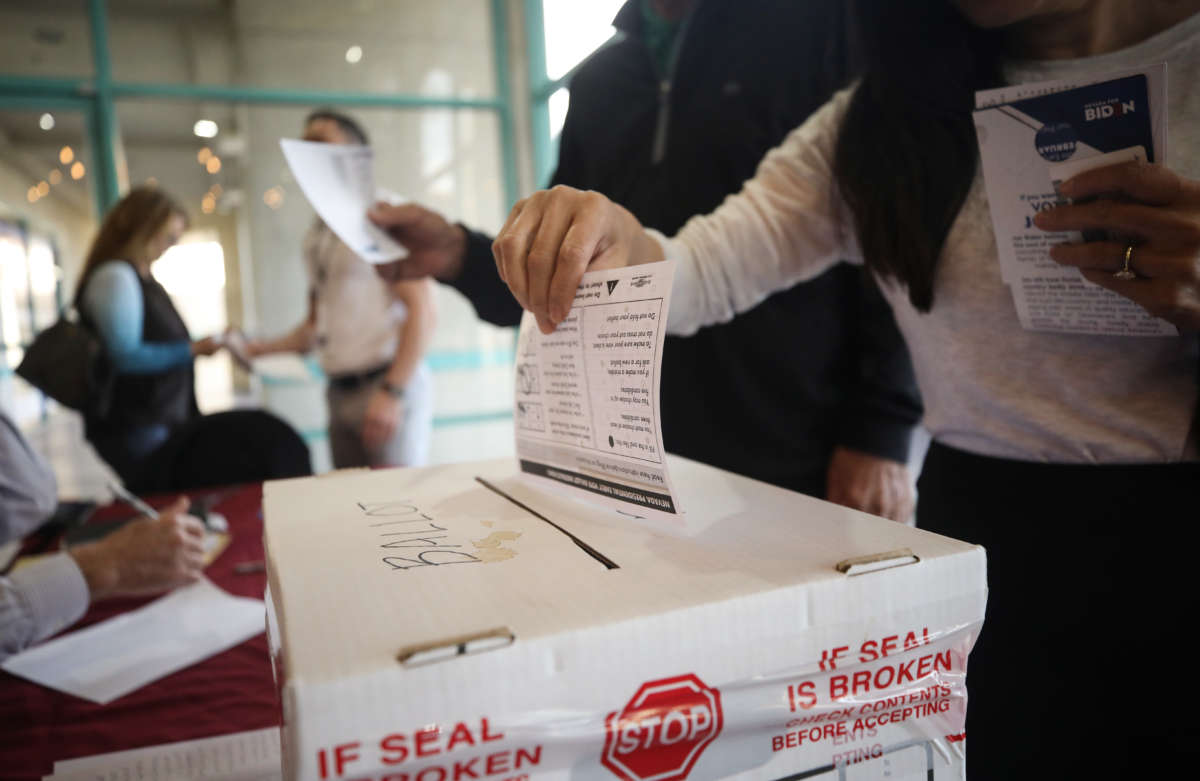Did you know that Truthout is a nonprofit and independently funded by readers like you? If you value what we do, please support our work with a donation.
With early voting already under way, Democratic campaigns and volunteers warned of the potential for chaos in Saturday’s Nevada caucus, even though the state party abandoned use of the same faulty mobile application which marred the results of the chaotic Iowa caucus.
Weeks after the Iowa caucuses, the Associated Press still has yet to declare a winner in the Democratic nominating contest because of errors in the reported results. The caucuses went off the rails when an app developed to report results malfunctioned, and a backup phone hotline was similarly overwhelmed.
Nevada scrapped plans to use the same app in its caucus. However, the state Democratic Party has kept mum about its new process — even to the candidates in the race.
“Campaigns said they still have not gotten the party to offer even a basic explanation of how key parts of the process will work,” The Washington Post reported Sunday. “Volunteers are reporting problems with the technology that’s been deployed at the last minute to make the vote count smoother.”
Experts have also raised concerns about the “tool” the state party plans to use in place of the app.
“It feels like the [state party is] making it up as they go along,” one Democratic campaign aide told The Post. “That’s not how we need to be running an election.”
The Nevada Democratic Party denied that it had kept campaigns in the dark.
“We are in constant contact with the campaigns,” a party official told The Post. “We communicate at a very high level with the campaigns . . . and we have kept them informed every step of the way.”
But another Democratic campaign aide claimed that the state party has been less than forthcoming during those discussions, sparking growing concerns.
“If the party had this process well-defined and had confidence in it, I think that we’d know a lot more about it,” the aide said.
Multiple campaigns told the outlet that the party has not only rushed certain decisions but also neglected to notify campaigns before announcing updates to reporters.
“We have been learning more about this process from the media than the state party or the DNC,” a campaign aide told The Post.
Another aide said the Democratic National Committee was similarly not helpful.
“They are the ones who also can demand answers,” the aide said. “They are supposed to be the ones who are the adults in the room, who can trust and verify. And that hasn’t happened to our knowledge.”
DNC spokeswoman Xochitl Hinojosa pushed back on that claim, saying both the committee and the state party were in “regular communication with campaigns.”
“We are confident that they are doing everything they can to implement lessons learned in Iowa, and we have deployed staff to help across the board, including tech support and volunteer recruitment,” Hinojosa said.
Beyond issues with the process, experts are also worried that the state party is using Google Forms to check in voters and report results.
“Browser-based forms don’t work well,” Joe Verschueren, who runs a company that makes custom forms, told The Post. “Google Forms is very simple.”
The state party told The Post that it consulted with the Department of Homeland Security and Google to “ensure the process would remain secure.” However, the report noted that it was “not clear exactly how the party has been working to vet security issues.”
Early voting has already kicked off in Nevada, and some precincts have already reported issues, including problems with the Google Forms registration that caused some sites to switch to paper. The state party blamed high turnout for the problems.
“There was no training on the tool because they’re still working on it,” Seth Morrison, a site lead for several precincts in Nevada, told CNN. “We’ve had a lot of training in how the process works, but no training on the tool, how we get the voting data or how we get results to the party Saturday night. All they have said on the tool and calculation side is: ‘Trust us. We’ve got it well in hand. We can’t tell you what vendors we use, because then they’ll be hacked.’”
Morrison decried the process and called for the end of caucuses entirely during his appearance on CNN.
“We’re counting on this untested tool that we haven’t been trained on,” he said, slamming the “horrendous” caucus process. “Both parties need to really eliminate it.”
A terrifying moment. We appeal for your support.
In the last weeks, we have witnessed an authoritarian assault on communities in Minnesota and across the nation.
The need for truthful, grassroots reporting is urgent at this cataclysmic historical moment. Yet, Trump-aligned billionaires and other allies have taken over many legacy media outlets — the culmination of a decades-long campaign to place control of the narrative into the hands of the political right.
We refuse to let Trump’s blatant propaganda machine go unchecked. Untethered to corporate ownership or advertisers, Truthout remains fearless in our reporting and our determination to use journalism as a tool for justice.
But we need your help just to fund our basic expenses. Over 80 percent of Truthout’s funding comes from small individual donations from our community of readers, and over a third of our total budget is supported by recurring monthly donors.
Truthout’s fundraiser ended last night, and we fell just short of our goal. But your support still matters immensely. Whether you can make a small monthly donation or a larger one-time gift, Truthout only works with your help.
